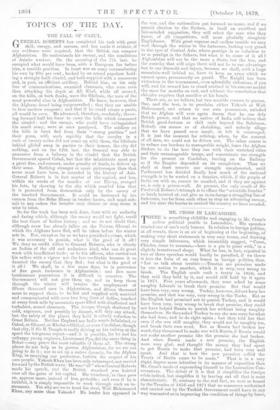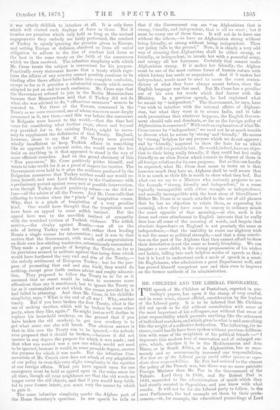MR. CROSS IN LANCASHIRE.
THERE is something childlike and engaging in Mr. Cross's artless political prattle in Lancashire. His speeches remind one of one's early lessons. In relation to foreign politics, at all events, there is an air of beginning at the beginning, of making very short statements in very easy terms, and drawing very simple inferences, which irresistibly suggest, "Comet Charles, come to mamma,—here is a pin to point with," in a slightly transformed shape. What he has, in fact, repeated in two or three speeches would hardly be parodied, if we threw it into the form of an easy lesson in foreign politics, thus. "Let us talk about treaties :—Treaties are promises made by one nation to another, which it is very, very wrong ta
break. The English made such a treaty in 1856, and they said they held by it, and would still hold by it again in 1871. Five years afterwards, they were asked by some naughty Liberals to break their promise. But that would have been very, very wrong. Turkey, however, did not keep her promise, and that was very, very wrong in the Turks. But as the English had promised not to punish Turkey, and it would have been very, very wrong to break that promise, they could not have helped Russia to punish her without being naughty themselves. So they asked Turkey to say she was sorry for what she had done, and to do right again ; but they told her that even if she was still naughty, they would not be naughty too, and break their own word. But as Russia had broken her word, they threatened To make war with Russia, if Russia would not make another promise like the promise she had broken. And when Russia made a new promise, the English were very glad, and thought the money they had spent to get Russia to make that promise, had been very well spent. And that is how the new promises called the Treaty of Berlin came to be made." That is in a very slight degree more infantine in its manner of exposition than Mr. Cross's mode of expounding himself to the Lancashire Con- servatives. The defect of it is that it simplifies the foreign crisis indeed, but simplifies it by leaving out all that is most characteristic. If, contrary to the real fact, we were so bound by the Treaties of 1856 and 1871 that no massacres authorised and carried out by the Turkish Government could have in any way warranted us in improving the condition of things by force, it was utterly childish to interfere at all. It is only force which will control such displays of force as those. But if treaties are promises which only hold so long as the mutual engagements they embody are fairly performed, the conduct of Turkey in openly' ignoring the promise given to Europe, and setting Europe at defiance, absolved us from all moral obligation to adhere to the line of conduct laid down as the best in the same treaty on the faith of the assurances which we then received. The infantine simplicity with which Mr. Cross treats the subject is convenient for his purpose. Practically every statesman knows that a treaty which regu- lates the affairs of any country cannot possibly continue to be binding after those affairs have fallen into complete confusion, except so far as it provides a substantial remedy which seems adapted to put an end to such confusion. Mr. Cross says that the Government refused to join in the Berlin Memorandum because that Memorandum said that if Turkey did not do what she was advised to do, "efficacious measures" were to be resorted to. Yet three of the Powers, concerned in the Treaty as we were concerned, one of whom was even more deeply concerned in it, saw then,—and this was before the massacres in Bulgaria were known to the world,—that the time had come for considering what further steps, above and beyond any provided ,for in the existing Treaty, might be mess- sary to supplement the deficiencies of that Treaty. England, however, chose to say that if the Treaty were proved wholly insufficient to keep Turkish affairs in something like an approach to external order, she would none the less insist on anything in it that appeared to stand in the way of more efficient remedies. And on the grand obstinacy of this "Non possuraus," Mr. Cross positively prides himself, and wants to take credit for it as a proof of respect for treaties. The Government even held to it after the evidence produced by the Bulgarian massacres that Turkey neither could nor would re- form herself, and sent Lord Salisbury to he Conference with a preliminary protest against every sort of possible intervention, even though Turkey should positively refuse—as she did re- fuse—all the advice of all the Powers. And Mr. Cross calls that adhering to treaties when the " pinch " of temptation comes. Why, that is a pinch of temptation of a very peculiar kind. One would have thought that the temptation must
have been an appeal to some selfish instinct. But the appeal here was to the unselfish instinct of sympathy with the wretched victims of Turkish violence. The selfish motive,—the rivalry against Russia,---WAS all on the side of letting Turkey work her will, rather than lending Russia a single excuse for intervention and it was to that motive that the Government, with much self-congratulation on their own law-abiding tendencies, ostentatiously succumbed. They made a great parade of keeping the Treaty, so far as its provisions seemed to militate against that being done which would have furthered the very end and aim of the Treaty,— the orderly settlement of European Turkey ; but for the pur- pose of promoting that end and aim itself, they would do nothing, except pour forth useless advice and empty admoni- tion. They proposed to follow the Treaty in so far as it
o
assumed that no resort would be taken t measures more efficacious than any it sanctioned, but to ignore the Treaty so far as it contemplated an end which the means provided by it had failed in attaining. And then Mr. Cross, in his childlike simplicity, says, "What is the end of all War? Why, another treaty. But if you have broken the first Treaty, what is the use of making another, which will be broken by some other party, when they like, again V' He might just as well decline to replace his household crockery, on the ground that if you have broken the old crockery, to get new crockery is to get what some one else will break. The obvious answer is that in this case the Treaty was to be ignored,—for nobody
-b ever proposed that it should be broken,—ecause it did not answer in any degree the purpose for which it was made ; and that what was wanted was a new one which would not need to be ignored, because it would, in some Passable degree, answer - the purpose for which it was made. But the infantine Con- servatism of Mr. Cross's view does not admit of any adaptation
of our policy to even this very slight complexity in the equities of our foreign affairs. What you have agreed upon for one emergency must be held as agreed upon in the same sense for all time, though all your neighbours see that the old words no longer cover the old objects, and that if you would keep faith- ful to your former intent, you mast vary the means by which to gain it.
The same infa,ntine simplicity marks the Afghan part of the Home Secretary's speeches. In one speech he tells us
that if the Government can .see "an Afghanistan that is strong, friendly, and independent, that is all we want ; but it must be every one of these three. It will not do to have one without the others,—to have an Afghanistan strong without being friendly, or strong without being independent. Then our policy falls to the ground." Now, it is clearly a very odd way of securing that Afghanistan shall be either strong, or friendly, or independent, to invade her with a powerful army, and occupy all her fortresses. Certainly that cannot make Afghanistan strong. If it makes her friendly, the Afghan must be one of the most curious forms of lawman nature with which history has made us acquainted. And if it makes her independent., words must be used to mean the exact contra- dictory of what they have always meant before, since the English language was first used. But Mr. Cross has a peculiar use of his own for words which find favour with the Ministry. In a previous speech, he had explained what he meant by "independent." The Government, he says, have "no wish to interfere with the internal affairs of Afghani- stan, but what they want is to secure India, and to take such precautions that whatever happens, the English Govern- ment should rule and dominate, so far as the foreign policy of Afghanistan is concerned." With such an explanation of what Mr. Cross means by "independent," we need not be at much trouble to discern what he means by 'strong' and 'friendly.' He means by strong,' helpless for any purpose which we do not approve ; and by 'friendly,' impotent to show the hate for us which Afghans will too probably feel. He would, indeed, have no objec- tion to their being really friendly, if they could but feel really friendly to an alien Power which intends to dispose of them. in all foreign relations for its own purposes. But as this can hardly be expected, what Mr. Cross does mean to insist on is that however much they hate us, Afghans shall be well aware that it is as much as their life is worth to show what they feel. But what can we say to a Minister who seriously proposes to use the formula " strong, friendly and independent," in a sense logically incompatible with either strength or independence, and morally incompatible with the least atom of friendliness Either Mr. Cross is so much attached to the use of old phrases that he has no objection to retain them, as expressing his meaning, when they have come to convey to ordinary minds the exact opposite of that meaning,—or else, such is his dense and crass attachment to English interests that he really does lose all sense of the meaning of words, and forgets that absolute dependence on England is not precisely the same as independence,—that the inability to resist our slightest Wish is not the same as political strength,—and that a deep convic- tion on the part of the Afghans that they cannot afford to show their detestation is not the same as hearty friendship. We can imagine a mere child, in the strong prepossession of his wishes and habits, falling into such helpless modes of speech as this ; but it is hard to understand such a mode of speech in a sensi- ble Englishman, who administers a great Department well, and has proved himself competent now and then even to improve on the former methods of its administration.



































 Previous page
Previous page